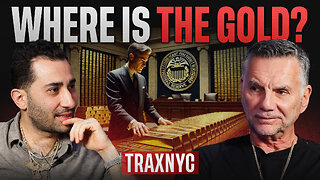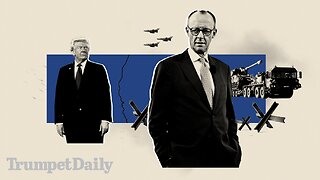Premium Only Content

Episode 2779: Hollywood's Portrayal of Sacred Figures: Part 1: The Chosen
Hollywood's Portrayal of Sacred Figures
Introduction Prayer:
Heavenly Father,
We gather in Your holy presence, seeking wisdom and clarity as we discuss the depiction of Your divine truth in media today. Grant us the grace to discern what honors You and leads souls closer to Your Sacred Heart. May the Holy Spirit guide our words and reflections, so we remain steadfast in our love for Your Son, Jesus Christ, and the teachings of His Church.
Through the intercession of the Blessed Virgin Mary, the pure and perfect Mother of God, help us to reflect her humility and faithfulness as we examine how her life and the lives of the saints are portrayed. St. Joseph, foster father of Jesus and protector of the Holy Family, pray for us as we seek to uphold the dignity of Christ and His Church in our discussion. We ask this in the name of Jesus Christ, our Lord. Amen.
The organization was called the National Legion of Decency (later renamed the National Catholic Office for Motion Pictures). It was established in 1934 by the Catholic Church in the United States to monitor and evaluate films for their moral content. The Legion encouraged Catholics to pledge not to watch or support films that were deemed immoral or offensive to Catholic teachings.
The organization categorized movies into ratings like "morally unobjectionable," "morally objectionable in part," and "condemned." Films receiving a "condemned" rating were considered inappropriate for Catholics, and the Church strongly advised against viewing them. The Legion of Decency had a significant influence on Hollywood and film production for several decades.
The National Legion of Decency gradually lost influence starting in the 1960s due to cultural shifts and changes in the Church's approach to media. It was officially disbanded in 1980, when the organization was fully absorbed into the United States Conference of Catholic Bishops' (USCCB) Office for Film and Broadcasting. This office continued to review films but with a less rigid and more advisory approach, reflecting the Church's broader efforts to engage with modern media rather than strictly condemn it.
So why am I bringing this up. Well I have been asked by certain friends my opinion of the movies series called the “Chosen” and I gave them my thoughts.
So I watched part of the series and here was my take away:
Potential Concerns:
Theological Imbalance: As a series created by Protestant filmmakers, The Chosen occasionally reflects theological views that deviate from Catholic teaching. For example, the portrayal of the Virgin Mary has been noted as lacking the depth of her Catholic doctrinal significance, such as her role as the Mediatrix of all graces. This can be problematic for Catholics who value a robust Marian theology
1. Diminished Marian Role: The Virgin Mary is depicted in a way that aligns more with Protestant understandings, focusing primarily on her humanity rather than her unique role in salvation history. This portrayal downplays key Catholic teachings, such as her Immaculate Conception, perpetual virginity, and her role as the Mediatrix of all graces a title underscoring her intercessory role in dispensing God’s graces through Christ
2. Lack of Doctrinal Depth: Catholic theology venerates Mary as the Mother of God (Theotokos) and emphasizes her unparalleled relationship with Jesus. Her portrayal in The Chosen does not sufficiently reflect this depth, instead opting for a more approachable, "ordinary" characterization. While this may resonate with broader audiences, it fails to capture her sanctity and the fullness of her doctrinal significance
3. Ecumenical Concerns: As a Protestant production, the series avoids explicit references to Catholic Marian doctrines like her Assumption or Queenship. While this neutrality appeals to ecumenical audiences, it can create a skewed understanding of Mary’s role within the Church and her importance in Catholic spirituality
Implications for Catholic Viewers
For Catholics who hold a robust Marian theology, this portrayal may feel insufficient or even misleading. Mary’s unique role as the sinless Mother of God and her cooperation in Christ’s redemptive work is central to Catholic devotion and liturgy. By failing to fully integrate these dimensions, The Chosen risks presenting a theologically incomplete version of Mary’s significance.
Christological Issues: Some interpretations in the series, such as the portrayal of Jesus’ human knowledge, do not align with Catholic teachings that emphasize His dual nature fully divine and fully human without error or limitation in His divine knowledge. Such presentations might inadvertently diminish His divinity, creating theological ambiguities.
1. Depictions of Limited Knowledge:
In Catholic theology, Jesus, as the Divine Word made flesh, possesses both human and divine knowledge. His human intellect is perfectly united to His divine nature and, therefore, free from error or limitation in His divine understanding. The Catechism of the Catholic Church (CCC 471–474) teaches that while Jesus grew in human experience (Luke 2:52), His divine knowledge included immediate and perfect awareness of the Father’s will and His salvific mission.
In The Chosen, Jesus is sometimes portrayed as uncertain or hesitant in decision-making, implying He lacks full knowledge of future events or His divine plan. For example:
• In one episode, Jesus is shown rehearsing His Sermon on the Mount, suggesting a need for human preparation to perfect His teaching.
• In another scene, He expresses uncertainty about the timeline of His ministry, portraying a more "humanized" deliberation.
These interpretations emphasize His humanity in ways that could overshadow or diminish His divine omniscience, potentially confusing viewers about the nature of the Hypostatic Union (the union of His human and divine natures).
________________________________________
2. Diminished Divine Authority:
Certain creative liberties in The Chosen depict Jesus engaging in casual or overly familiar interactions with His disciples. While these moments are intended to make Him relatable, they sometimes risk underplaying His divine authority and the reverence due to Him as the Son of God. For instance:
• Scenes where Jesus jokes with His disciples or responds with human frustration, though artistically compelling, could lead to misunderstandings about His sinlessness and perfect divine will.
• This focus on His humanity can inadvertently draw attention away from His divinity, creating an imbalance in the portrayal of His dual nature.
________________________________________
3. Theological Ambiguities:
In Catholic thought, Jesus’ divine mission and actions are always deliberate and purposeful, reflecting His unity with the Father (John 10:30). Depictions in The Chosen that imply Jesus is "discovering" His role or making decisions based on incomplete knowledge introduce theological ambiguities. This risks reinforcing heterodox views, such as Adoptionism or Nestorianism, which have been condemned by the Church.
________________________________________
4. Catholic Perspective on Christ's Knowledge:
Catholics understand that while Jesus' human knowledge was "acquired" (through experience), it was also perfectly infused with divine wisdom. The Council of Chalcedon (451 AD) affirmed that Jesus is "true God and true man," and His divine nature ensures His knowledge is complete and flawless. Portraying Him as limited in understanding or overly humanized in behavior risks undercutting the profound mystery of His divine and human natures.
________________________________________
Recommendations for Catholic Viewers:
While The Chosen can serve as a starting point for reflection on the life of Christ, Catholics should approach its Christological interpretations with caution. To deepen understanding, viewers may wish to consult Church-approved resources like the Catechism, writings of the Church Fathers, and papal encyclicals such as Dei Verbum. These resources provide a richer and more theologically accurate understanding of Jesus' dual nature and mission.
Ecumenical Tone: While the ecumenical aim of the series has drawn praise, it sometimes simplifies or omits key Catholic doctrines to appeal to a broader Christian audience. This includes aspects of the sacraments, the Church's magisterial authority, and the role of tradition, which are central to Catholicism
1. Simplification of the Sacraments:
• The Chosen often depicts significant events in Jesus’ ministry without adequately emphasizing their sacramental nature, a cornerstone of Catholic theology. For example, the series does not fully explore the institution of the Eucharist, which is central to Catholic worship as the Real Presence of Christ in the Blessed Sacrament. Without this emphasis, the sacramental dimension of Jesus’ ministry is muted, potentially misrepresenting His mission for Catholic viewers.
• The portrayal of Baptism similarly lacks depth in showing its transformative grace and necessity for salvation, as taught by the Catholic Church.
2. Absence of the Church’s Magisterial Authority:
• Catholicism views the Church as the "pillar and bulwark of the truth" (1 Timothy 3:15), with its magisterial authority safeguarding and interpreting divine revelation. However, The Chosen presents Jesus and His teachings in a way that often aligns with a "Scripture alone" perspective, common in Protestant theology. This approach can inadvertently downplay the Church’s role in preserving and transmitting the faith through tradition and apostolic succession.
• By omitting references to Peter’s primacy and the foundation of the Church (Matthew 16:18), the series misses an opportunity to portray the establishment of the visible Church that Catholics hold as instituted by Christ.
3. Minimal Focus on Tradition:
• Catholic theology places great importance on Sacred Tradition as a coequal source of divine revelation alongside Sacred Scripture. The series’ reliance on modern scriptural interpretation, rather than incorporating elements of Tradition, aligns more closely with Protestant perspectives.
• For example, the portrayal of certain events, like Jesus calling His disciples, reflects creative liberties that lack grounding in traditional Catholic understanding, potentially leading to theological ambiguities.
4. Mary and the Saints:
• The Virgin Mary is portrayed with a more Protestant-influenced perspective, emphasizing her humanity but omitting her unique role in salvation history, such as her Immaculate Conception, Assumption, and title as Queen of Heaven. Similarly, the series avoids exploring the role of saints, an integral part of Catholic spirituality, leaving a gap in its depiction of Jesus’ relationship with His holy followers.
5. General Ecumenical Risks:
While the ecumenical approach seeks to unite Christians across denominational lines, it risks "watering down" theological depth to avoid alienating non-Catholic audiences. This can lead to misunderstandings among Catholic viewers about the full richness of their faith.
________________________________________
Recommendations for Catholic Viewers:
• Catholic viewers should be aware that The Chosen reflects an ecumenical, predominantly Protestant perspective. To supplement their understanding, Catholics can turn to Church-approved resources such as the Catechism of the Catholic Church, writings of Church Fathers, and theological works that delve deeply into the sacraments, Tradition, and the Church’s authority.
• Viewing The Chosen as a supplementary, rather than definitive, portrayal of Jesus’ life is essential to maintaining a proper understanding of Catholic doctrine.
Portrayal of Saints and Figures: The depiction of figures like John the Baptist has been described as disappointing, reflecting more personal artistic liberties rather than a faithful adherence to scriptural and traditional accounts
1. John the Baptist:
John the Baptist is a central figure in the New Testament and is venerated as a saint in Catholicism. In The Chosen, his portrayal deviates from traditional accounts. He is depicted as a more disheveled, eccentric character, with a focus on his unkempt appearance and rugged lifestyle, which is not necessarily inaccurate but may feel overemphasized to the point of misrepresentation.
• Catholic Teaching: Catholic doctrine emphasizes John the Baptist’s role as the precursor to Christ, the one who heralded the coming of the Messiah (Matthew 3:1-3). His humility and obedience to God's will are central to his character. However, The Chosen sometimes portrays him with personal motivations or idiosyncrasies that might detract from his deep spiritual mission and prophetic calling.
• Impact on Viewers: This artistic license could lead to a misunderstanding of John’s sanctity, particularly the depth of his role in salvation history, as emphasized in the Church’s liturgical texts and teachings (see the Office of Readings for the Feast of the Nativity of John the Baptist).
2. The Apostles:
• The portrayal of the apostles in The Chosen similarly takes creative liberties. For instance, the series depicts certain apostles, like Peter and Matthew, in ways that are influenced by modern psychological understandings or fictionalized backstories. While this approach is designed to make the characters more relatable, it can dilute the theological significance of their call and mission.
• Catholic Understanding: For Catholics, the apostles are revered not just for their personalities but for their unwavering commitment to spreading the Gospel. The portrayal of Peter as impulsive and sometimes overly emotional, while not necessarily inaccurate, risks overshadowing the theological emphasis on his role as the first Pope, which is foundational to Catholicism (Matthew 16:18-19).
3. Artistic License vs. Scriptural Fidelity:
While The Chosen aims to humanize its characters, there are concerns about how far this artistic license stretches, especially regarding figures like Mary Magdalene, Nicodemus, and others who are integral to Catholic tradition. By focusing on making these figures more relatable to a broad audience, the series sometimes sacrifices theological depth and scriptural fidelity.
• Catholic Tradition: Figures like Mary Magdalene hold particular significance in Catholic tradition not only for their direct relationship with Jesus but also for their role in the early Church and the development of Christian spirituality. The Church celebrates her as a saint with a feast day and has given special attention to her transformation and witness (Luke 7:36-50, John 20:1-18). The Chosen may portray her too simplistically at times, missing out on deeper theological meanings tied to her repentance and sanctification.
4. Theological Discrepancies:
• The portrayal of figures in The Chosen sometimes simplifies or omits aspects of Catholic theology, especially regarding the communion of saints. For example, the series may not provide sufficient emphasis on the role of saints in intercessory prayer or the deeper theological dimensions of the early Church’s structure, which are foundational to Catholic belief.
• The Church’s Teachings on Saints: In Catholic theology, saints are revered not merely for their historical roles but also for their spiritual witness and continued intercession for the faithful. By focusing less on these theological points, The Chosen risks presenting a vision of these figures that lacks full doctrinal fidelity.
Conclusion:
While The Chosen is a popular series that has sparked renewed interest in the life of Christ, its portrayal of saints and biblical figures may not align entirely with Catholic tradition.
By emphasizing their human qualities and personal struggles over their theological significance, the series risks obscuring the depth of their roles in God's plan of salvation. Catholic viewers may find value in the series’ character development but should approach it with an awareness of these discrepancies, always turning to the teachings of the Church for a fuller understanding of these sacred figures.
For deeper insights into the Catholic view of these figures, one might refer to sources like the Catechism of the Catholic Church, especially sections on saints and the Church’s teaching on their intercession, or writings from Church Fathers like St. Augustine and St. Gregory the Great.
Spiritual Sensitivities: The creative liberties taken in imagining conversations and events not explicitly described in scripture can be seen as inappropriate or even irreverent from a Catholic perspective, especially if they unintentionally mislead viewers about Church teachings
1. Invention of Conversations and Events:
• The series often includes dialogue or scenarios that are not present in the Gospels. These additions can sometimes feel trivial or disrespectful, as they introduce speculative details about sacred events. For instance, when portraying moments from the life of Jesus or His interactions with the apostles, the show may invent conversations that humanize these figures but that could lead viewers to assume these events are doctrinally significant, even when they are not.
• Catholic Perspective: Catholic tradition emphasizes that any depiction of sacred events should remain faithful to the Gospel and avoid misleading viewers. The Catechism of the Catholic Church (CCC 116) stresses that the Scriptures, while open to interpretation, must be respected and preserved in their integrity. By adding fictitious dialogue or events, The Chosen risks presenting an inaccurate portrayal of sacred moments that could distort the understanding of Christ’s mission.
2. Misleading Depictions of Sacred Moments:
• The creative portrayals of certain scenes, such as Christ’s interactions with His disciples or His actions during His ministry, sometimes focus on emotional aspects, neglecting the deeper theological meanings. For example, The Chosen may depict Jesus in more casual or intimate settings than what is traditionally emphasized in Catholic theology, which stresses His divine authority alongside His humanity.
• Catholic Understanding: Catholic doctrine affirms that Christ’s humanity is always in perfect union with His divinity. This means that while He shared in the human experience, He did so with perfect knowledge and grace, and His actions were always infused with divine purpose. To portray Him merely as a relatable figure without emphasizing His divinity risks misleading viewers about the nature of Christ. According to St. Augustine, for example, we should approach Christ not just as a teacher but as the eternal Word made flesh (cf. Confessions).
3. Speculative Depictions of the Virgin Mary:
• The portrayal of the Virgin Mary in The Chosen sometimes departs from traditional Catholic views, such as her perpetual virginity and her role as the Mediatrix of all graces. While the series portrays Mary as a loving and human mother, it may not fully capture the profound theological depth associated with her. For Catholics, Mary is venerated as the Mother of God and is deeply revered for her sinlessness, her role in the Church’s salvation history, and her intercessory power. The Chosen's emphasis on making Mary more relatable may unintentionally downplay these aspects of her spiritual stature.
• Catholic Perspective: The Church teaches that Mary is not merely an ordinary woman but the Mother of God, preserved from original sin and elevated to a unique role in the history of salvation (cf. Lumen Gentium, 56). Her "yes" to God's will was a decisive moment in human history, one that requires deep reverence, which may be diminished by a portrayal that focuses too much on her everyday struggles or doubts.
4. Overemphasis on Human Struggles:
• The Chosen tends to highlight the personal struggles of characters, including the apostles and even Jesus, in a way that aligns with contemporary views on mental health, trauma, or personal growth. While this is not inherently wrong, the focus on these human aspects may overshadow the divine purpose behind the events. This is particularly sensitive when it comes to scenes involving Jesus, whose divinity and mission are paramount in Catholic teaching. By focusing too much on His human experience (without sufficient emphasis on His divinity), the series could unintentionally mislead viewers into thinking that Jesus' purpose was primarily personal or emotional rather than salvific.
• Catholic Teaching: Catholicism holds that Jesus’ mission on Earth was to redeem humanity. The Church emphasizes the importance of Christ’s divine nature (as defined in the Council of Chalcedon) and His role as Savior of the world. While acknowledging His humanity is essential, it is crucial not to downplay His divinity and eternal mission. The series could potentially lead to misunderstandings by focusing more on emotional struggles rather than the divine love and sacrifice central to Catholic belief.
5. Reverence vs. Relatability:
• In seeking to make the biblical story relatable to modern audiences, The Chosen sometimes sacrifices the reverence due to sacred persons and moments. For Catholics, these moments are not merely historical events but acts of divine revelation, requiring the utmost respect. The introduction of invented dialogue or too casual portrayals risks losing the sacredness that defines these moments in Catholic piety and liturgy. The sacredness of the Eucharist, for example, is fundamental to Catholic belief, but a series like The Chosen, by focusing on the personal side of the characters’ lives, might not adequately highlight its theological importance.
• Catholic Perspective: The Church holds that liturgical actions and sacraments, such as the Eucharist, are deeply sacred. The Catechism of the Catholic Church (CCC 1324) teaches that the Eucharist is the "source and summit of the Christian life," and it should be approached with deep reverence and understanding. A portrayal that does not fully emphasize the divine nature of these moments can mislead viewers and diminish the seriousness of their spiritual significance.
Conclusion:
The Chosen’s approach to creative liberties in interpreting biblical events and characters, though well-intentioned, can sometimes stray from the doctrinal and spiritual depth emphasized in Catholic teaching. For Catholics, these liberties can be seen as inappropriate or irreverent, especially when they mislead viewers about the sacredness of the characters, events, or teachings. Catholics are encouraged to enjoy the series with discernment, keeping in mind that while it may offer a relatable perspective, it is crucial to maintain fidelity to the Church’s understanding of Scripture and tradition.
-
 47:39
47:39
Michael Franzese
4 hours agoJewelry King Trax NYC EXPOSES How the Powerful Steal from You
45.3K8 -
 LIVE
LIVE
Slightly Offensive
3 hours ago $2.86 earnedCandace REDPILLS the Masses in BOMBSHELL Theo Von Interview | Guest: Shane Cashman
1,095 watching -
 LIVE
LIVE
megimu32
3 hours agoON THE SUBJECT: IRL Streamers Attacked & Nostalgic Animal Movies That Made Us Cry
397 watching -
 1:00:54
1:00:54
The Tom Renz Show
7 hours agoMore Epstein/FBI, a Scary Trade War, & the Dem Echo Chamber
7.49K1 -
 40:43
40:43
Kimberly Guilfoyle
8 hours agoDems Double Down on Delusion-Why? Live with Tony Kinnett & Bo French | Ep.202
77.8K31 -
 1:28:42
1:28:42
Redacted News
6 hours agoBREAKING! SOMETHING BIG IS HAPPENING IN EUROPE ALL OUT WAR IS COMING AGAINST RUSSIA, TRUMP FURIOUS
121K272 -
 47:50
47:50
Candace Show Podcast
6 hours agoBREAKING: Judge Makes Statement Regarding Taylor Swift's Text Messages. | Candace Ep 155
113K110 -
 1:14:23
1:14:23
Josh Pate's College Football Show
3 hours ago $0.29 earnedCFB’s Most Hated Teams | FSU & Clemson Future | Big Ten Win Totals | Star Rankings Overrated?
14.5K -
 1:33:47
1:33:47
CatfishedOnline
5 hours agoGoing Live With Robert - Weekly Recap
27.8K -
 55:18
55:18
LFA TV
1 day agoEurope’s Sudden Turn Against America | TRUMPET DAILY 3.6.25 7PM
32.2K3